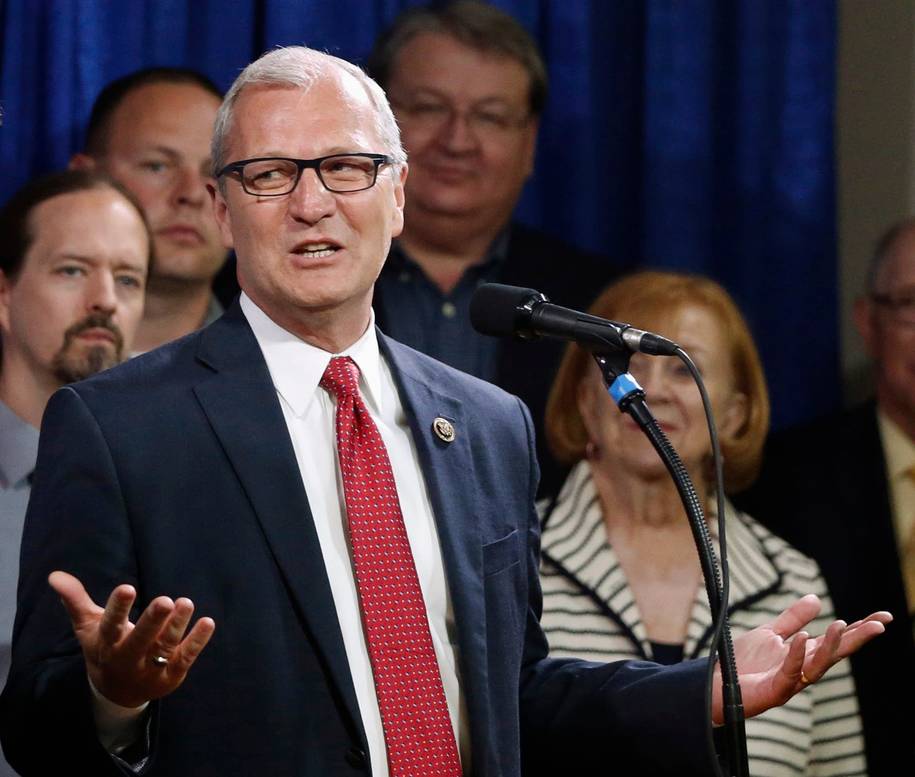 Asshole
Asshole
Fuck this guy. First, he says this:
Representative Kevin Cramer of North Dakota has repeatedly made headlines this year in his race against Senator Heidi Heitkamp because of off-the-cuff comments that range from inflammatory to indelicate. But his latest provocation on sexual misconduct sparked a furious and tearful rejoinder from Ms. Heitkamp on Sunday, one day after she voted to oppose the Supreme Court nomination of Justice Brett M. Kavanaugh.
In an interview, Mr. Cramer, a Republican, sought to explain why his bombast from issues like tariffs to how he treats people had not undercut his challenge against Ms. Heitkamp, the most endangered Senate Democratic incumbent. Mr. Cramer is leading Ms. Heitkamp in public opinion polls.
North Dakotans, he said, appreciate the value “of saying what a lot of other people don’t dare say — but think.”
Asked for an example of what he meant, he ripped into the #MeToo movement.
“That you’re just supposed to believe somebody because they said it happened,” Mr. Cramer said, alluding to Christine Blasey Ford — who has accused Justice Kavanaugh of sexually assaulting her when they were teenagers — and, more broadly, women who have come forward to claim that they were sexually abused or assaulted.
Invoking his wife, daughters, mother and mother-in-law, Mr. Cramer said: “They cannot understand this movement toward victimization. They are pioneers of the prairie. These are tough people whose grandparents were tough and great-grandparents were tough.”
Suggesting that the #MeToo movement had created a backlash as the left tried to torpedo Justice Kavanaugh’s nomination, Mr. Cramer added, “The world got to see close up how ugly it can be when you go too far.”
Then the asshole kept doubling down on these comments to Brian Kilmeade on Fox and Friends:
On Wednesday morning during a segment on Fox and Friends, host Brian Kilmeade and GOP candidate Kevin Cramer attacked the MeToo movement for going “too far,” suggesting that in the past women in America were “tougher” about sexual abuse because they “were raised on the prairie”.
Brian Kilmeade then pressed Cramer on the MeToo movement. “You think it’s gone too far”, he said, “generations in the past, in your family, women were tougher, they were raised on the prairie. Do you want to expand on that?”
Cramer agreed with Kilmeade’s assessment that women in the past were tougher on sexual assault. He added that he believes the “zeal of the movement [MeToo] has gone too far, to the point where they are accosting male members of the United States Senate in the Capital in elevators. And then they cry victim as soon as they are spoken back to”.
So it’s bad enough this asshole keeps doubling down on these remarks because he knows his party has been doing everything it can to prevent Native Americans from voting in North Dakota:
The Supreme Court on Tuesday refused to block a key provision of North Dakota’s voter ID requirement, ensuring that the law will be in effect during the 2018 midterm election. As Justice Ruth Bader Ginsburg pointed out in her dissent, this decision is bad news for the thousands of voters who may now be unable to cast a ballot in November. It’s also terrible news for Sen. Heidi Heitkamp, a Democrat defending her seat against Rep. Kevin Cramer, a Republican challenger who’s ahead in the polls. By design, North Dakota’s law disproportionately disenfranchises Native American voters, who lean Democratic. Tuesday’s ruling could swing the election toward Cramer—and deny Democrats control over the Senate.
Until recently, voting in North Dakota was relatively easy. The state has no voter registration; historically, residents could simply show up at the polls and provide some form of identification (no photo required). If they lacked ID, voters could sign an affidavit confirming their eligibility. The GOP-controlled Legislature began cracking down on suffrage shortly after Heitkamp eked out an unexpected victory in 2012, winning by fewer than 3,000 votes. Republicans introduced a stringent voter ID requirement, then scrapped the affidavit option. A federal district court blocked the new rules in 2016 as a likely equal-protection violation due to the massive burdens they placed on Native American voters. The Legislature tweaked the law in 2017, but the court again froze a large chunk of it in April, citing its “discriminatory and burdensome impact on Native Americans.”
Thanks to this decision, the most draconian components of North Dakota’s voter ID law were not in effect during the state’s June primary. In late September, however, the 8th Circuit Court of Appeals reversed the district court in a 2–1 decision. The appeals court allowed the state to implement the part of the law that compels voters to provide an ID that includes his or her current residential street address. This provision is controversial because it seems to directly target Native Americans. The U.S. Postal Service doesn’t provide residential delivery in rural reservations, so most tribal members use a P.O. box, which is listed as their address on tribal IDs. To remedy this problem, the district court had ordered the state to accept IDs that list a current mailing address. But the 8th Circuit scrapped that compromise, permitting the state to reject IDs that include a mailing address but no street address—that is, a huge number of tribal IDs.
How many, exactly? The district court found that at least 4,998 otherwise eligible Native Americans do not have an ID with a current street address. They are not alone: About 65,000 non–Native American voters also lack the necessary ID. The law does allow voters to provide “supplemental documentation” to prove their identity, such as a utility bill or bank statement. But once again, Native Americans are disproportionately unlikely to have these materials, due in part to poverty and homelessness within their communities. Thus, at least 2,305 Native Americans may not be allowed to cast a ballot in the 2018 election.
In theory, disenfranchised Native Americans can surmount these obstacles. The district court held that residents who lack the necessary ID must be allowed to vote if they present documentation from a tribal government, like a formal letter establishing their residency. And the state didn’t challenge this part of its ruling, allowing it to stand. But homeless and impoverished voters will surely struggle to obtain this paperwork in time for the election.
There are two things you can do:
1. Get involved with the Native American Rights Fund to help fight back against these laws and help Native Americans be able to vote. Click here.
2. Click here to donate and get involved with Heitkamp’s re-election campaign.




Leave a Reply